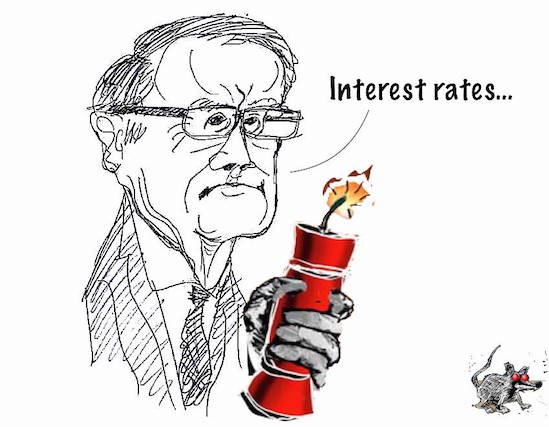Search
Democracy Links
Member's Off-site Blogs
interesting...
 interest
interest
Politicians love nothing more than winning elections.
There's the glow that comes with knowing the public has trusted you with office over your political opponents, and the excitement of what a term might bring.
There are policies to enact and promises to keep, jobs to hand out and history to write.
But whoever wins the next federal election, which has to be held by May, has a whole bunch of political curve balls already heading their way.
The last thing a newly-elected government wants to do is watch life become more expensive for millions of constituents, knowing they will likely cop the blame.
And yet that is exactly what lies in wait for whoever is Prime Minister come June 2022.
What goes down, must come back upAt the start of 2020, interest rates were already very low. The Reserve Bank had the cash rate target at 0.75 per cent.
By late March 2020, as the pandemic was unfolding within Australia and across the globe, it had been slashed to 0.25 per cent, and by late 2020 is was at 0.1 per cent.
A lot of people saved a lot of money, as their mortgage repayments shrunk.
But historic lows can't last.
In evidence to Senate Estimates this week, Treasury Secretary Steven Kennedy spelled it out.
"It's very unusual for them to be where they are today," he said.
"And I think it will be in the longer term interest of the country for them to return to a higher level when circumstances allow it to."
That is - it's not just that interest rates will rise, it's actually important that they do.
Which is good news for those with money locked up in savings accounts, but bad news for anyone with a variable mortgage.
So when are they going up?That's entirely a matter for the Reserve Bank, and Governor Phillip Lowe says rate rises this year are "plausible".
Financial markets think they are a whole lot more likely than that.
In fact, they're forecasting rates to jump to 1.25 per cent by the end of the year, starting in June.
That's five interest rate rises in six months.
That would be a pretty significant hit to plenty of mortgage holders - by some estimates, roughly $300 a month for those with a $500k mortgage.
And should it happen, it would be politically tricky to navigate.
Turning back the tide: can anyone really control interest rates?
The Coalition has already begun making some familiar noises, suggesting interest rates would be lower under a re-elected Morrison government than under Labor.
John Howard tried some similar tactics in 2007, only to see the Reserve Bank raise rates right in the middle of his election campaign.
Mr Howard apologised to the borrowers of Australia, saying he regretted the additional burden they faced.
During Senate Estimates, Labor's Katy Gallagher questioned Finance Minister Simon Birmingham on whether rates would go up under a future Coalition government.
Senator Birmingham conceded it was somewhat out of the government's hands.
"Where interest rates go precisely will be a matter for the Reserve Bank," he said.
"What we can do as a government, and what we will do as a government, is seek to put in place and maintain policy settings that keep them as low as possible for Australians."
He argued that a Coalition government will simply spend less money than a Labor government, meaning the RBA won't have to pump the brakes on the economy quite as hard.
The political nightmare over the horizonThe good news awaiting whichever party wins the upcoming election is by the look of things, they will inherit a fairly robust economy.
There is genuine hope among many economists that very low unemployment might start to trigger some decent pay rises for Australians.
And many people, if they were not put out of work during the lengthy lockdowns in much of the country, actually used the opportunity to build their savings.
That's the good news. The bad news is pretty bad.
The prospect of eighteen months of fairly consistent interest rate hikes will be hard to look at for an incoming government.
There is a solid argument that interest rates need to be raised to provide a lever to pull in the event of future economic downturns (including the possibility of more dangerous COVID variants).
Rising rates can also be a sign of a healthy economy. As Stephen Kennedy said, the economic recovery is an opportunity to "normalise" interest rates.
But it might be a hard message to sell to Australians digging deeper in their pocket for their mortgage repayments every fortnight.
Read more:
FREE JULIAN ASSANGE NOW √√√√√√√√√√√√√√√√√√√√
- By Gus Leonisky at 22 Feb 2022 - 5:59am
- Gus Leonisky's blog
- Login or register to post comments
Recent comments
36 min 47 sec ago
56 min 12 sec ago
1 hour 4 min ago
1 hour 46 min ago
2 hours 19 min ago
3 hours 59 min ago
4 hours 4 min ago
9 hours 30 min ago
10 hours 9 min ago
21 hours 2 min ago